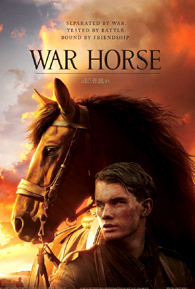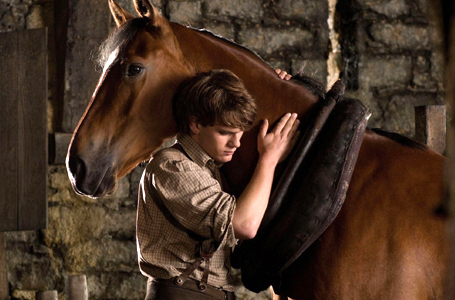
Joey is a horse born in an idyllic corner of England who is raised on the farm of the Narracott family. He is the especial pet of son Ted (Jeremy Irvine), who raised him from a frisky colt to a powerful workhorse. The world changes, motor cars arrive, and soon follow the tanks. The Great War begins, and young men and horses are not spared from the front lines. Joey is sold to the Western front when the Narracott farm crop fails, and experiences the horrors of war first hand before an entire generation of young men do. Being a rule of cinema that no animals in the world are nobler than horses and dogs, on paper this must have sounded like a winner.
Not that it hasn't been done before. The premise of War Horse brings to mind one of the greatest films of all time: Robert Bresson's Au Hasard Balthasar, once described by Jean Luc Godard as "the world in an hour and a half". It is told through the eyes of a donkey who as a beast of burden, suffers for the petty cruelties of men in a small, mean, prejudiced little French village.
Cinephiles who expect to see Spielberg work this concept into the frame of a contemporary large scale blockbuster will be sorely disappointed by how measured, tasteful and lacking in impact Spielberg's film is. Make no mistake that Spielberg remains a master of timing, pacing and mise en scene, but the heretofore idealistic director and movie mogul seeks always to find a syrupy redemptive edge to the bleakest of scenarios. There are acts of cruelty here (of man on animal and also man on man) but always done in too tasteful a manner to lack impact, what with Spielberg always over self-consciously cutting away from scenes of brutality in an artful manner that serve to distance the audience rather than provoking their imagination on the horrors of war.
It does not help that the story does not have a real villain whatsoever or even any character that seems wholly detestable even if it were peace time. The film's best scenes are therefore, not surprisingly, its warmest. A scene where two soldiers from different sides of the war attempt to free Joey after the beast is caught in concertina wire is told with winning, gentle humour.
As for Joey himself, he is about as well-written as a realistic horse can be. His defining trait being that in every adverse circumstance, his sole course of action is to run, whether it takes him into trouble or away from it. The film does not answer if such is to ennoble him, or to somehow resonate with the fates of an entire generation of young men who disappeared in the trenches of the Great War. Maybe the film doesn't know. Its noble beast shoulders the burden of an entire generation, but only barely the burden of an entire movie.












 列印版本
列印版本









